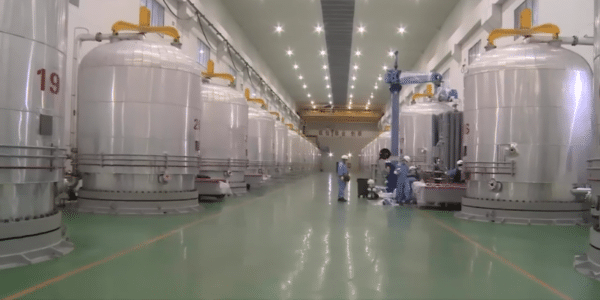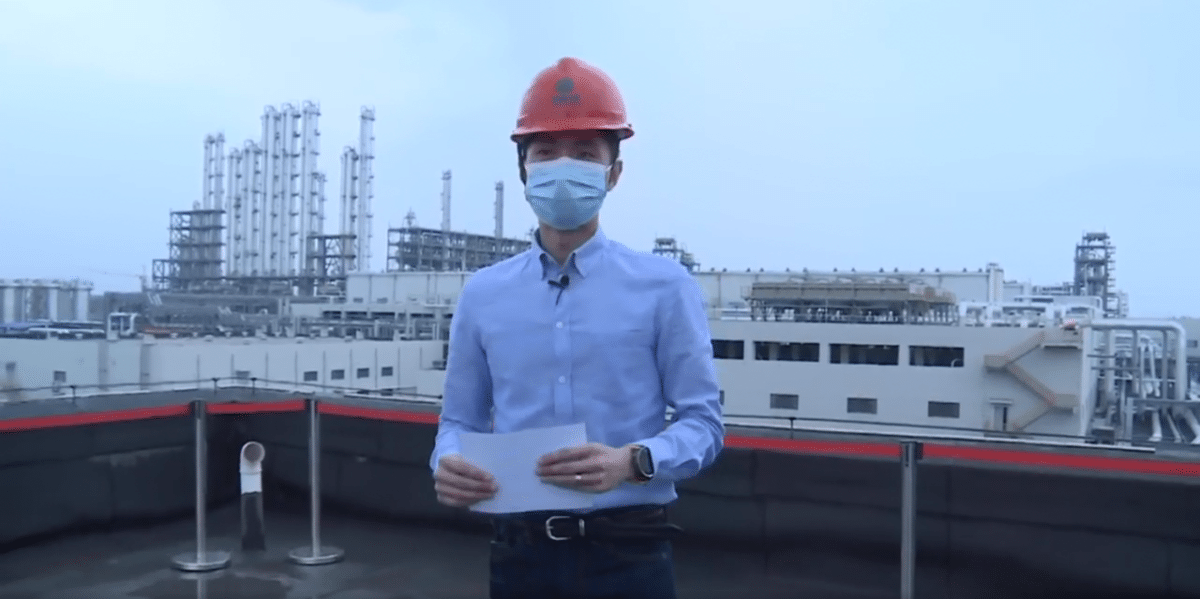From the roof terrace of the reception building, there's a good view of the Phase 4a factory on the right-hand side. “It is the latest one”, says Kevin He, who works in investor relations at silicon producer Daqo New Energy. On the left hand of the video shows is what is supposed to become Daqo's Phase 4b factory. The former facility consists to a large extent of pipes, tubes, vessels and whatever one imagines heavy industry to be. At the new factory site, only cranes can be seen. The Phase 4b fab is still just a construction site and is expected to be fully ramped up by the end of the year, explains Kevin He. Last week, the company invited analysts for a tour of the site and released a 90-minute video of the visit.
The video is instructive for anyone who wants to learn about modern silicon production and does not have the opportunity to visit such a factory themselves. The elephant in the room, however, is not mentioned by Kevin He or anyone else in the video: the allegations that forced labor is used in the Chinese region of Xinjiang. Indeed, the Financial Times described the tour as a “charm offensive”

Image: screenshot, Daqo video
Daqo CEO Longgen Zhang, however, did comment on the matter in a press release on the visit: “As stated repeatedly, we do not condone the use of forced labor under any circumstances.”
In the video, the camera, accompanied by soft background music, moves through empty stairwells into a control room equipped with an impressive wall of screens. The group enters a bus that drives across the site and then walks into factory floor with the furnaces. Green floor, white walls, lots of pipes and technology – employees are notable in their absence.
“Our visitors were able to see that our chemical process, which is highly automated, digitalized, technology-intensive, is not conducive to employing unskilled labor,” Longgen Zhang explains in the press release.
Obviously, it is not possible to prove that forced labor does not exist with a company tour and therefore it is no surprise that the discussion continues on various sides.
A few days after the factory visit, the Helena Kennedy Centre at the Sheffield Hallam University in the United Kingdom published a report containing what is probably the most detailed collection of links to official documents related to many of the well-known solar-grade silicon and polysilicon manufacturers based in Xinjiang.
The report’s authors claim that the information proves the clear links between the solar companies located in Xinjiang and forced labor programs. The researchers’ main argument is that the regional government has attracted many polysilicon manufacturers by granting a series of fiscal and economic incentives since 2015. Manufacturers that invest in the region have little opportunity to avoid the local government programs known as “surplus labor” and “labor transfer” involving the Uyghur and Kazakh indigenous minorities, the report claims. These programs, it adds, include forced labor practices.
“After 2016, by which time the camp system had begun to emerge, companies that ‘absorbed surplus laborers’ to work in their facilities received significant incentives, including subsidies for the cost of building new factories, transport of the products made there to the coast, training for the new labor recruits (including Chinese language training), transport of new workers, and salaries of workers,” the researchers say. They speak of a pervasive impact of Xinjiang labor transfers on the entire solar supply chain.
Concerning Daqo, however, the Sheffield publication only concludes from the IPO prospectus that it “may indicate that the company employs state-sponsored labor transfers in its own facilities, as “placement” is a term the central government and Xinjiang regional and local governments sometimes use for labor transfers.” Also this is, obviously, no smoking gun.
From the Netherlands to the EU
The allegations of forced labor in the Chinese solar industry became a major issue in the Netherlands when Dutch Minister for Foreign Trade and Development Cooperation Sigrid Kaad discussed the matter on May 18, answering questions submitted in Parliament in April by members of the center-right Christian Democratic Appeal (CDA), the Labour Party (PvdA) and the green GroenLinks party.
Kaad cited a report by US-based Horizon Advisory, often used as a source to support the allegations, but said the government thus far did not have sufficient evidence to verify the validity of the information provided by the study.
The minister did not exclude the possibility that subsidies could have been given to solar projects relying on PV panels whose production could have stemmed from a supply chain that may have involved Uyghur forced labor. Kaad stated that the current requirements of the Netherlands’ subsidy programs for solar and renewable energy did not require companies to investigate or certify the entire supply chain of a product.
“I will also raise the issue during the Foreign Affairs Council (Trade) of 20 May 2021,” Kaad said, adding that she had also discussed the matter with French Minister Delegate for Foreign Trade and Economic Attractiveness Franck Riestener and European Commissioner for Justice Didier Reynders.
Supply chain law in Germany
In Germany the law is clearly evolving in the direction of making companies more accountable for their supply chain. A week earlier, the scientific service of the German Bundestag, which is supposed to provide MPs with independent information, had already published a 128-page paper on the legal implications of the situation in Xingjiang for German companies. Although it finds “no explicit indications of a physical-biological intention to destroy,” it does see “an intention of social destruction” with respect to the Uyghur population.
This is particularly explosive in Germany in view of the fact that the Bundestag is about to vote on a supply chain law under which companies could face fines if they violate their “human rights due diligence obligations”. If they cannot counter “human rights risks within their supply chain” in any other way, they may have to end business relations with particular suppliers. Even criminal liability of company employees cannot be ruled out, the paper states.
In this respect, the end of the discussion is likely to be a long way off and the impact on the photovoltaic supply chain very difficult to assess at present. Just the existence of risk that human rights are being violated is relevant to companies when administering their supply chain, even if there is no evidence of human rights violations by an individual supplier.
It is therefore no surprise, as the Financial Times reports, that Daqo executives plan to request an independent third-party audit.
This content is protected by copyright and may not be reused. If you want to cooperate with us and would like to reuse some of our content, please contact: editors@pv-magazine.com.




Have you ever thought of using second life solar panels that have been replaced- yet still work to get sent to small island nations or Africa as an example. Providing a cheap reausable resource for these impoverished countries and prevent unnecessary landfill and recycling.
Also assisting any supply line difficulties currently occurring post pandemic.
Jason